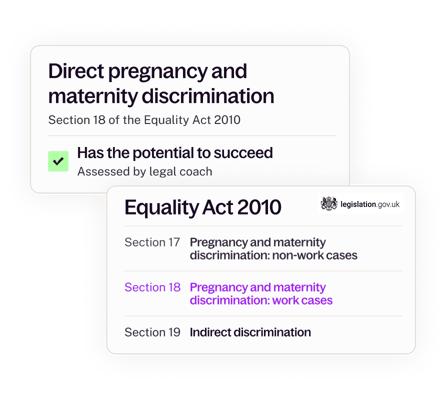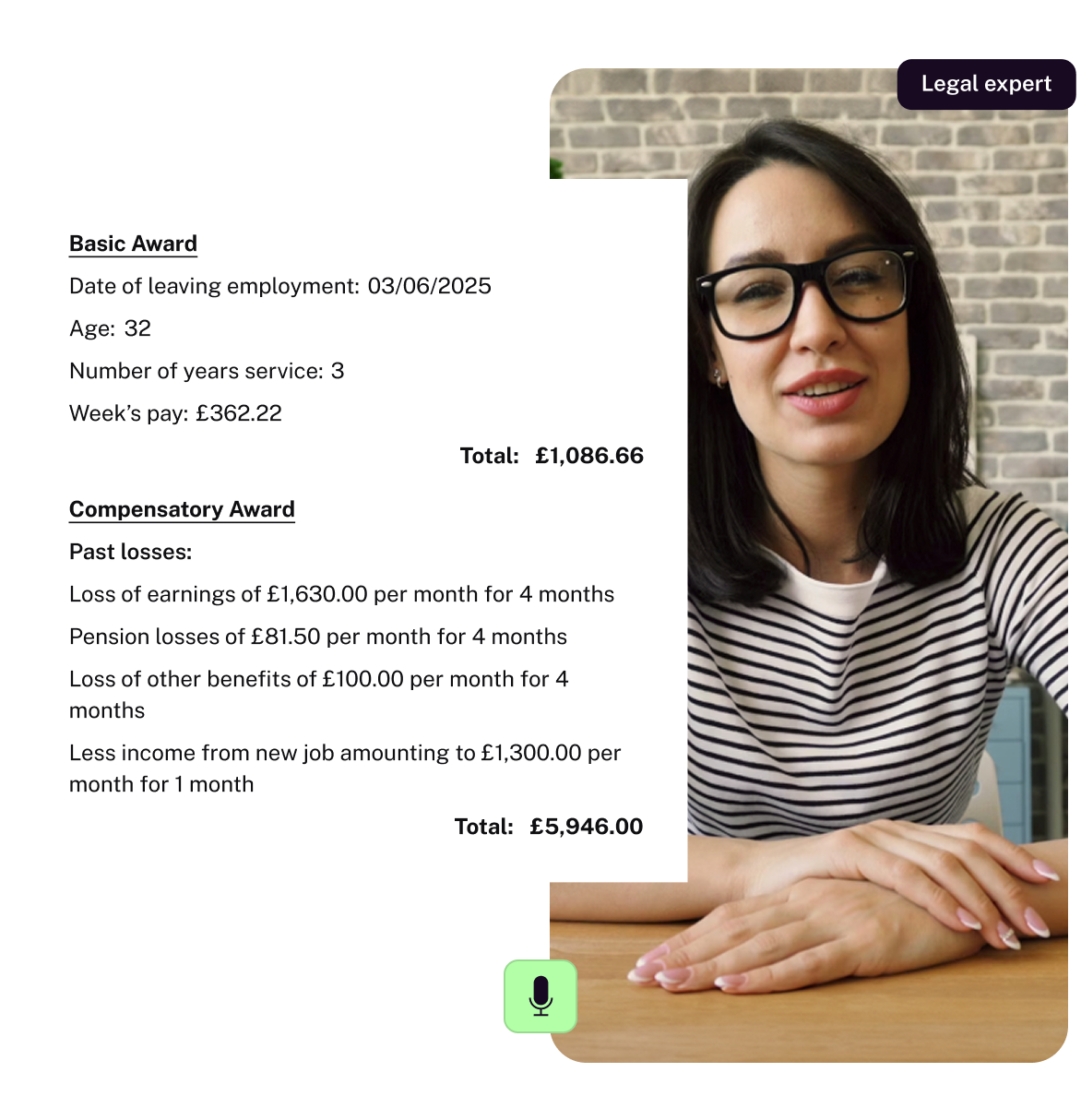What you get: essentials for a fair settlement

Clear legal grounds
Show your employer you're serious and prepared with clearly defined, professionally-checked details of your claims.

Clear legal grounds
Show your employer you're serious and prepared with clearly defined, professionally-checked details of your claims.
Qualified UK legal experts • Completely confidential
"Solicitors are so expensive that having some affordable legal advice was really useful and helped keep my resolve. Masumah helped me with the list of issues, and I believe this greatly helped me achieve the settlement I wanted."
- CL, 22 May 2024
"I received amazing support and advice leading up to my preliminary hearing. Could not have done it without them and will definitely use them again. Would recommend 100%"
- Nicola, 3 February 2025
"Valla supported me for well over a year and enabled me to be a litigant in person for my ET claim, which ultimately I settled out of court for the full compensation amount requested"
- Jen, 1 October 2024
Frequently asked questions
What is a settlement agreement?
A settlement agreement is a formal contract between you and your employer to resolve your workplace problem. Settlement agreements are written down and signed by both of you. You don’t need a court or Tribunal to reach a settlement.
To reach agreement, both sides negotiate what they are willing to do to reach a resolution. This often means one side drafts the contract (usually your employer) and then you send versions back and forth between you until you are both happy with it.
Usually, a settlement agreement means that you are paid a sum of money in return for either:
- not starting an Employment Tribunal claim, or
- withdrawing a Tribunal claim that you’ve already started.
What does a settlement agreement include?
A settlement agreement typically includes a combination of things like:
- a compensation payment (the amount they agree to pay for you to drop the case)
- payment for your notice period
- payment for any holidays
- your employer's contribution to your legal fees (see below)
- an agreed reference that the employer will give for you
- agreements about confidentiality.
Read more about how to negotiate the terms of a settlement agreement.
What is a COT3 agreement?
A COT3 agreement is a settlement arranged through Acas during Early Conciliation. It’s a faster and often simpler way to settle workplace disputes, and doesn’t require you to get independent legal advice—though it can still help.
When can I ask for a settlement?
You can explore a settlement at any time—before raising a formal grievance, during disciplinary action, after resigning, or even after starting Acas Early Conciliation. The key is being prepared and knowing your legal position.
What is a “without prejudice” letter?
A “without prejudice” letter is a way to open informal settlement discussions with your employer without those discussions being used against you later. Valla can help you draft one to start negotiations confidently.
Can I negotiate with my employer on my own?
Yes, you can. Valla gives you the tools and legal insight to negotiate directly with your employer, including a case assessment and clear breakdown of your legal claims and potential Tribunal values.
What does the Valla Settlement and COT3 Assessment include?
You’ll get a 1-hour call with a UK legal expert, followed by a professional report outlining your potential legal claims, how strong they are, and what they may be worth at Tribunal. This helps you negotiate with confidence.
How much does the assessment cost?
The Settlement and COT3 case assessment costs £149. This includes a full legal review and a written report tailored to your situation.
Will my employer cover the cost of legal advice?
Potentially. It's common for employers to contribute towards legal fees for review of settlement agreements—typically around £500 plus VAT. You can ask for a higher contribution during negotiations if needed.
What’s the difference between a settlement agreement and a COT3?
The main difference is how the agreement is made. A settlement agreement is negotiated directly between you and your employer (with or without lawyers). A COT3 is reached through Acas during Early Conciliation and is often quicker.
Is the assessment confidential?
Yes. Everything you share with Valla is completely confidential and reviewed only by qualified UK legal experts.
How to start settlement negotiations with your employer
Settling before contacting Acas
If you and your employer agree to settle before you bring the matter to Acas, you will typically use a settlement agreement, which is a document negotiated directly between you and the employer (and any lawyers either of you may have). Acas and any other bodies don't get involved in this settlement agreement.
Requirement for independent legal advice
Without prejudice letters
Acas Early Conciliation and COT3 agreements





